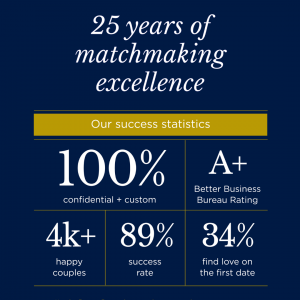Selective Search Celebrates 25 Years of Luxury Matchmaking Excellence
Milestone anniversary marks a legacy of transforming lives through a proven, personalized approach
Selective Search, the nation’s leading luxury matchmaking firm, proudly marks its 25th anniversary this year, celebrating a quarter-century of helping accomplished individuals find meaningful, lasting relationships through a distinctive, executive-style search process.
Founded in 2000 by Barbie Adler, Selective Search was built on the belief that finding a life partner deserves the same rigor, strategy, and discretion as an executive search. Since then, the firm has grown into the industry gold standard, with a team of expert matchmakers and an industry leading 89% success rate.
“For 25 years, we’ve served as a trusted partner to discerning men and women who are ready to take a smarter, more intentional approach to their love lives by listening, understanding, and connecting them to their future partner,” said Barbie Adler, Founder and President of Selective Search. “This milestone reflects not just our longevity, but the real impact we’ve made in people’s lives.”
Over the past 25 years, Selective Search has perfected its proprietary six-step Meet Your Future® process. Grounded in psychology, executive recruiting, and human behavior, this proven process has helped the team successfully match over 4,000 happy couples, with 34% of members finding love with their first match.
“Selective Search clients value their time, reputation, and personal privacy,” said Adler. “Our services ensure a discreet, behind-the-scenes process that respects their status and lifestyle.”
Recognized in Forbes, The New York Times, Entrepreneur, and other national outlets, Selective Search sets the standard in the premium matchmaking industry.
“While technology has changed the dating landscape, our mission remains true to a personal approach to help exceptional individuals find someone truly aligned with their values, lifestyle, and goals,” said Adler.
Grace Urban
Selective Search
+1 312-813-3844
grace|selectivesearch.com| |grace|selectivesearch.com
Visit us on social media:
LinkedIn
Instagram
Facebook
YouTube
X
Legal Disclaimer:
EIN Presswire provides this news content "as is" without warranty of any kind. We do not accept any responsibility or liability for the accuracy, content, images, videos, licenses, completeness, legality, or reliability of the information contained in this article. If you have any complaints or copyright issues related to this article, kindly contact the author above.
Alvarez Plumbing Expands Sewer Camera Inspections & Hydro Jetting Drain Cleaning Services in Monterey County, CA
Lost Writings of Wartime Journalist Sue Moody to be Published for the First Time
Aldridge Construction Expands High-Quality Home Remodeling and Property Management Renovation Service in Monterey County
Więcej ważnych informacji
 Jedynka Newserii
Jedynka Newserii

 Jedynka Newserii
Jedynka Newserii

Ochrona środowiska

A. Bryłka (Konfederacja): Ograniczenie emisyjności nie musi się odbywać za pomocą celów klimatycznych. Są absurdalne, nierealne i niszczące europejską gospodarkę
W lipcu br. Komisja Europejska ogłosiła propozycję nowego celu klimatycznego, który zakłada ograniczenie emisji gazów cieplarnianych o 90 proc. do 2040 roku w porównaniu do stanu z 1990 roku. Został on zaproponowany bez zgody państw członkowskich, w przeciwieństwie do poprzednich celów na 2030 i 2050 rok. Polscy europarlamentarzyści uważają ochronę środowiska i zmiany w jej zakresie za potrzebne, jednak nie powinny się odbywać za pomocą nieosiągalnych celów klimatycznych.
Polityka
Dramatyczna sytuacja ludności w Strefie Gazy. Pilnie potrzebna dobrze zorganizowana pomoc humanitarna

Według danych organizacji Nutrition Cluster w Strefie Gazy w lipcu br. u prawie 12 tys. dzieci poniżej piątego roku życia stwierdzono ostre niedożywienie. To najwyższa miesięczna liczba odnotowana do tej pory. Mimo zniesienia całkowitej blokady Strefy Gazy sytuacja w dalszym ciągu jest dramatyczna, a z każdym dniem się pogarsza. Przedstawiciele Polskiej Akcji Humanitarnej uważają, że potrzebna jest natychmiastowa pomoc, która musi być dostosowana do aktualnych potrzeb poszkodowanych i wsparta przez stronę izraelską.
Polityka
Wśród Polaków rośnie zainteresowanie produktami emerytalnymi. Coraz chętniej wpłacają oszczędności na konta IKE i IKZE

Wzrosła liczba osób, które oszczędzają na cele emerytalne, jak również wartość zgromadzonych środków. Liczba uczestników systemu emerytalnego wyniosła w 2024 roku ponad 20,8 mln osób, a wartość aktywów – 307,5 mld zł – wynika z najnowszych danych Urzędu Komisji Nadzoru Finansowego (UKNF). Wyraźny wzrost odnotowano w przypadku rachunków IKE i IKZE, na których korzyść działają m.in. zachęty podatkowe. Wpłacane na nie oszczędności są inwestowane, a tym samym wspierają gospodarkę i mogą przynosić atrakcyjną stopę zwrotu.
Partner serwisu
Szkolenia

Akademia Newserii
Akademia Newserii to projekt, w ramach którego najlepsi polscy dziennikarze biznesowi, giełdowi oraz lifestylowi, a także szkoleniowcy z wieloletnim doświadczeniem dzielą się swoją wiedzą nt. pracy z mediami.










.gif)

 |
| |
| |
|